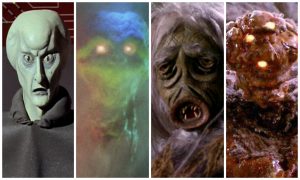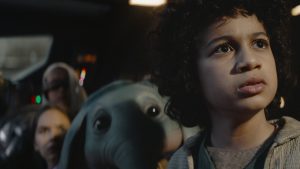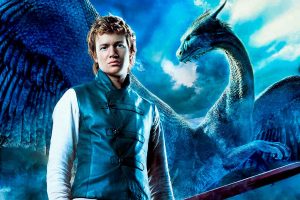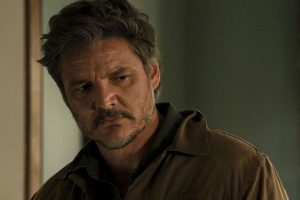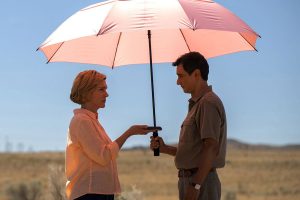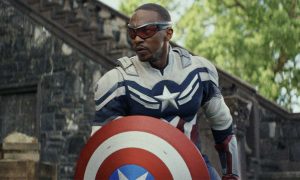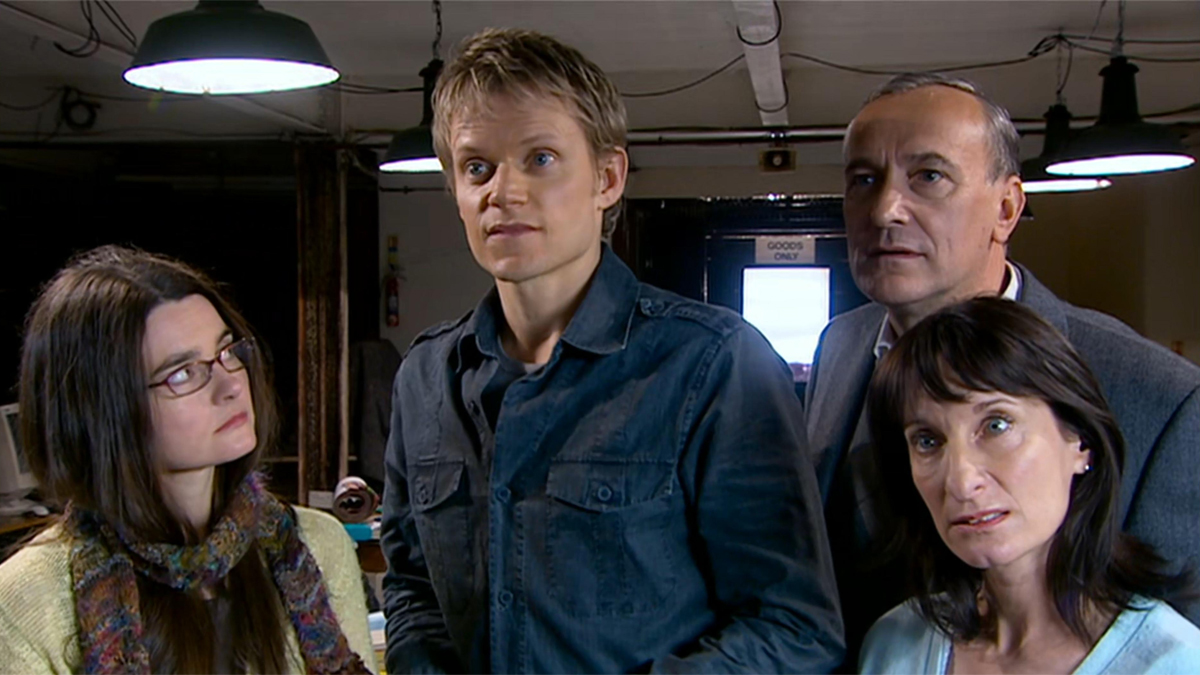
“You dabbled with aliens,” declares creature that had been posing as an alien hunter named Victor Kennedy. “Now meet the genuine article.”
It’s hard to put into words just how upsetting that genuine article is. Unsightly grey flesh drips from his shoulders and head, so that he resembles more a sentient glob of moldy yogurt than an actual person. Comedian Peter Kay makes his character even more upsetting by bearing his teeth and sticking out his tongue. And that’s before revealing that the faces of his victims protrude from his body still screaming for help, including a character noted for her sweetness stuck to his bottom.
Somehow, the worst part of the monster, dubbed the Abzorbaloff, is his behind-the-scenes origin. The Abzorbaloff design came from a child who won a contest through the long-running kid’s show Blue Peter. Whatever goodwill the contest may have bought for the ’00s revival of Doctor Who, then in its second series, the 2006 episode “Love & Monsters” blew it for many fans. The episode’s disgusting monster and odd tone has put off viewers for nearly 20 years.
Yet, the creation of the Abzorbaloff and its victims capture everything great about the early days of the Doctor Who relaunch.
Doctor Lite, Character Heavy
“Love & Monsters” was an early example of what Steven Moffat would later dub “Doctor Lite” episodes, stories more about the impact of the Doctor on those with whom they interact. In particular, showrunner and credited episode writer Russell T Davies and director Dan Zeff focus on Elton Pope (Marc Warren), a lonely young man who has wondered about the Doctor since a brief encounter with him as a child.
After seeing the Doctor again as an adult, Elton finds a support group, consisting of a motley collection of people who have encountered the Doctor. While this niche group, dubbed LINDA (London Investigation ‘N’ Detective Agency), does start out as a serious operation to gather information about the Doctor, it soon turns into more a social club. Not only does the group somehow become an Electric Light Orchestra cover band but Elton starts a romance with fellow member Ursula (Shirley Henderson).
That is, until Mr. Kennedy arrives and puts LINDA to work, pushing them to go on actual spy and reconnaissance missions to discover the whereabouts of the Doctor. At the same time, members start disappearing. By the end of the episode, we learn that Mr. Kennedy is the Abzorbaloff, who has been absorbing the members into his body and using the group as a means to trap and devour the Doctor himself.
If the evil alien plot clashes with the hangout storyline, well, that’s kind of the point. “Love & Monsters” isn’t really about the Doctor and his amazing adventures. Rather, it’s about the connections people form with one another, despite apparent differences. No one would expect a tight-laced middle-aged man like Mr. Skinner (Simon Greenall) to give attention to the hippy dippy young woman Bliss (Kathryn Drysdale, now a Bridgerton regular). But LINDA allows them to see one another as people, their differences notwithstanding.
The formation of the group underscores one of the chief themes of Doctor Who, the idea that humanity has much more in common than we do different. If we could simply see past our petty distinctions and work together, we’d live much better lives. Over and over, the Doctor tries to teach that lesson, but rarely has it been illustrated as well as with LINDA.
Those the Doctor Left Behind
Of course, Doctor Who has a long history of integrating humans into the Doctors’ adventures across space and time. Billie Piper‘s Rose Tyler, one of the most important companions in Doctor Who history, does make a brief appearance in “Love & Monsters.” But the episode isn’t about those who get to run off with the Doctor and witness amazing sights. It’s about everyone else.
“Let me tell you something about those who get left behind,” Rose’s mother Jackie Tyler says to Elton, sharing the hurt and powerlessness that comes from not knowing where or when your loved one might be.
As much as Elton and LINDA get the focus of “Love & Monsters,” its really the interactions with Jackie that carry the most weight. Jackie had been a regular supporting character on the show since the first season, and not always a favorite of fans, precisely because of the behavior she exhibits in this episode. Elton finds her in a laundromat while supposedly working undercover to gather information about Rose for Mr. Kennedy. As soon as Jackie sees Elton, she begins hitting on him aggressively, eventually convincing him to spend time alone with her at her flat.
It would be easy to make fun of Jackie in these scenes, playing on well-worn stereotypes about the sexuality of women over the age of 40. Instead, Davies directs all the jokes at Elton, goodhearted jabs at his shortcomings as a spy. And when Jackie discovers that Elton’s initial interest in her had nothing to do with her at all, not even as a sexual partner, actor Camille Coduri makes the hurt feel real. It’s not just that she’s lost her daughter to some amazing time-traveler with a magic blue box. It’s that her entire identity has been reduced to her connection to the Doctor.
Through Jackie, Davies and Zeff direct viewers attention from the spectacle of the Doctor’s adventures and the primary theme that’s been running through the franchise from the beginning: humans need to understand and care for one another.
Humor and Horror
Perhaps the biggest complaint lodged at “Love & Monsters” deals the episode’s sense of humor. After all, it ends with the suggestion that Elton and Ursula, the latter of whom has been reduced to a face on a slab of concrete, enjoy a sexual relationship. The horror of losing one’s body and selfhood (despite Ursula assuring Elton that she’s quite peaceful) dismissed in favor of a blowjob joke.
It’s a fair complaint, as “Love & Monsters” awkwardly wedges humor next to horror. However, that uncomfortable fit only underscores the episode’s theme about the legacy of the Doctor. The Doctors’ adventures are often delightful and breathtaking. We love to watch the over-the-top spectacle involved when Daleks descend on London or when the Master holds the world hostage. But while these episodes give maybe a couple of moments to mourning the humans who die along the way, it’s just lip-service. The Tenth Doctor saying, “I’m so, so sorry,” no matter how earnest, doesn’t cut it.
Thus, we viewers are left with the discomfort of the lingering memory of lives lost combined with the Doctor whipping out their Sonic Screwdriver and coming up with a brilliant new plan. The aftertaste is always there, no matter how delightful the solution or bombastic the score.
Intentional or not, “Love & Monsters” captures that feeling with its sense of humor. Take an early scene in which Elton watches the Doctor and Rose chase an alien monster through various doorways. The chase almost immediately becomes a Scooby-Doo gag, with the Doctor, Rose, and the alien Hoix running in and out of doors in different configurations.
Zeff shoots the scene in a deliberate way to highlight the homage, letting the trio run in and out immediately, without wasting time for them to change positions. However, Zeff also provides an in-universe reason for the lost time by taking Elton’s point-of-view. Elton can’t make sense of what he’s seeing because the arrival of the Doctor reminds him of his childhood encounter, the same night that he lost his mother.
In short, the gag happens because of Elton’s trauma response. No, those two elements should not work together. And they don’t fit smoothly, as the gag undercuts the trauma and vice versa. But it does work to show the complexity of living in a world in which the Doctor intercedes. Even when it’s fun adventure, it’s not all fun adventure. The Doctor always leaves something behind.
The Terrible and the Brilliant in Doctor Who
“So, there you go,” Elton says to his webcam at the end of the episode. “Turns out I’ve had the most terrible things happen… and the most brilliant things. Sometimes, I can’t tell the difference.”
It’s hard to find a better summation for Doctor Who as a franchise. Sometimes, it involves terrible things: a grandfather abandoning his family and taking a new form, a young genius sacrificing himself in a crashing ship, a daughter taken from her mother only to meet her again as a grown woman. Sometimes, it involves brilliant things, such as the sights the First Doctor shows his granddaughter Susan, the bond the Fifth Doctor forms with Adric, the delightful interactions between Amy Pond and River Song.
With season 14 wrapped and the 15th on the way next year, Doctor Who had entered a new era, once again run by Russell T Davies, but with a new Doctor in the form of Ncuti Gatwa, which means whole new set of fans have come aboard to learn this lesson all over. The dabbling in aliens brings plenty of brilliant moments for these new fans. But if they’ve gone back to watch “Love & Monsters,” they’ll get the genuine article, in all its upsetting and wonderful messiness.
The post The Divisive Doctor Who Episode That Captures Everything Great About the Russell T Davies Era appeared first on Den of Geek.
